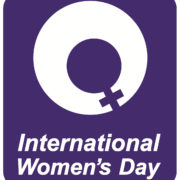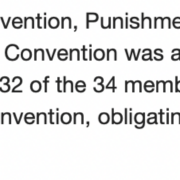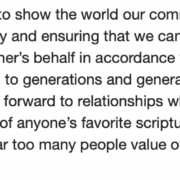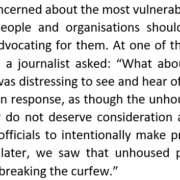It looks like we are in for another race to the bottom. We are now halfway through this term, and the Free National Movement will decide who its leader will be in the coming weeks. While the two candidates, from what we have seen thus far, are quite different, neither inspires confidence. The party itself has a significant amount of work ahead of it to define itself and prove itself to a new generation of voters and the voters who refused to show up for it in 2021. Two and a half years later, this work has not even begun. In fact, it seems to be working against itself. It is not even trying to play the role of Opposition, failing to draw attention to the governance failures, failing to offer solutions, and failing to model better practices.
Member of Parliament for St. Anne’s seemed to be upset by the announcement that The Bahamas now recognises Palestine as a state. The Bahamas took far too long to take this step, particularly as we witness, on a daily basis, the settler colonialism and genocide, by Israel, of Palestine and the Palestinian people. The Bahamas was the last CARICOM country to recognise Palestine as a state, and this is an embarrassment. White has now added to the embarrassment by his weak attempt to challenge it, and using “traditional allies” to do it. He said, “Our traditional allies, Madam Speaker, are countries that we haven’t aligned our position with, and I find that on such an important international issue, now it’s a national issue.”
The genocide of the Palestinian people has been an issue at the international, regional, and national levels for years, and without recognition of the same. As stated in the Caribbean Feminist Statement Against Israel’s Settle Colonial Project and Ongoing Genocide in Palestine, “We, Caribbean people, who have arisen from histories of genocide, enslavement, indentureship, and colonialism, remain firm and unwavering against all attempts at settler colonialism, apartheid, arbitrary arrests and detention, displacement and forced exile, confiscation of land and territories, sexual violence, and other human rights violations carried out by any State against any ethnic, racial, or geographic population. These images of violence are all too familiar.”
Over the past 228 days, we have seen the displacement of over 900,000 people from Gaza. We have seen the destruction of schools, mosques, and hospitals. We have watched as journalists report on the conditions with the eery sound of weapons flying overhead. We have read about the hunger, seen the images of injuries and death, and heard the cracks in the voices of thousands of people who continue to speak against the violence they are experiencing without end and call on us, the rest of the world, whoever our allies may be, to help them.
When we, human rights advocates, call on the government to fulfill its obligation to protect, promote, and ensure access to human rights, there is talk of “sovereignty.” When we reference the United Nations human rights mechanisms that The Bahamas has voluntarily adopted and ratified, such as the Convention on the Elimination of All Forms of Discrimination against Women (CEDAW), “sovereignty” comes up. When the United States Embassy flies the PRIDE flag at its locations, “sovereignty” is thrown around. For some reason, though, when it comes to The Bahamas taking a principled position — the right position — on the statehood of Palestine, it is time for The Bahamas to worry about its allies and their wishes. Why might that be? There are far too many people in positions of leadership who are ill-equipped, unprepared, and generally opposed to human rights, regardless of sovereignty or allyship. It seems, in fact, that they are playing a game that has nothing to do with the wellbeing of the people they claim to serve.
White said, “[…] the people of this nation, Madam Speaker, should be informed I think on a more regular basis on why some of these international decisions are being made, why we are agreeing one way or the other.”
He said this about the decision by The Bahamas to recognize Palestine as a state. He did not say this about countless other decisions made by the Government of The Bahamas with no announcement at all. There are no questions about the financial bills that are pushed through quickly and without consultation. There are no questions about the way The Bahamas votes at the United Nations on a regular basis. There are no questions about participation in InterAmerican processes or the decisions made therein. The continued failure of government officials to disclose assets is not a conversation this week. Why might that be?
Several human rights advocates have been calling on the government to communicate with the general public about its commitments and activities in international spaces. In fact, we have used international spaces and processes to demand that the government inform the Bahamian people of its commitments and to make human rights mechanisms accessible to the public. When we talk about the Universal Declaration of Human Rights, it should not be a cloudy concept for the general public, but a clear set of rights that we all can easily apply to their own lives, even if we cannot perfectly recite them. When we reference CEDAW, it should not evoke fear. When we remind the country that migrants are human beings with human rights, it should not be surprising or confusing. Perhaps successive administrations have enjoyed the low access to information for the general public which enables them to distract, to lie, and to create enemies of human beings rather than the inequitable systems we live within. Migrant people have always been scapegoats of choice, haven’t they?
It is no surprise that Minnis is not only running for leadership of the Free National Movement again, but that he is so easily and confidently referencing his spectacular failure from 2017 to 2021 — which even he was in a rush to escape with a nonsensically early general election — saying “Let’s do it again,” is a sure sign of delusion or confidence that, in a race to the bottom, he is a good bet.
Rather than focusing on the state of the country, largely due to his egotistical, sloppy, tyrannical “leadership” and the current administration that is taking full advantage of the terrible precedent set in many areas, including undisguised abhorrence for the press, he has taken aim at some of the most vulnerable people in the country. Instead of acknowledging the harm already done by terrible decisions and devastating inaction, he is going the lazy route of scapegoating Haitian migrants. He said that he would “aggressively deport all undocumented people” and claimed he would regularize those who have been in The Bahamas for a long time. These two promises are not aligned. The first is, in fact, quite troubling when we should know what is happening right now in Haiti. (It is important that we do not pretend that he was talking about all migrants. He meant, as they always mean, Haitian migrants).
Pintard, on the other hand, said the Free National Movement should not “make every immigrant a tyrant”. He pointed to willingness to collaborate and a duty to solve problems. It is cause for concern that these conversations do not seem to be taking place within the party and, importantly, across the obvious factions. Is there no clear direction for the party? No shared values? No clarity on what leadership means and looks like in practice?
We have not seen strong leadership from Pintard who has been in the ideal position to demonstrate his ability over the past few years. The current Opposition has fallen into the same practices as every Opposition before it, opposing for the sake of it, criticizing at every turn, and offering no solutions. It is old, it is tired, it is ineffective, and it serves no one. This is unfortunate, not only for a party that is vying for leadership in the next general election, but for the people of The Bahamas who need a true, properly functioning Opposition.
Anyone who is serious about leading a political party, not to mention leading a country, must demonstrate their values. These are not centering hatred of people or particular groups of people. Values are indicative of positions on pressing issues. People who are serious about leadership are clear in their positions. If they cannot decide for themselves, they certainly cannot be trusted to listen to and make decisions in the best interest of others. When will the Progressive Liberal Party and the Free National Movement figure out who they are and where they stand on critical issues? How will they communicate their identities to us? What will it take for them to be truly people-centred? Who, within these parties, are leaders with the competence to listen, learn, collaborate, communicate, and act with the most vulnerable in mind? If it takes anywhere near two more years to see manifestos and charters, we need to be clear that there are no leaders in these parties, and there are no parties prepared to lead.
Published in The Tribune on May 22, 2024.











Leave a Reply
Want to join the discussion?Feel free to contribute!